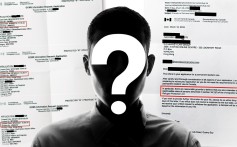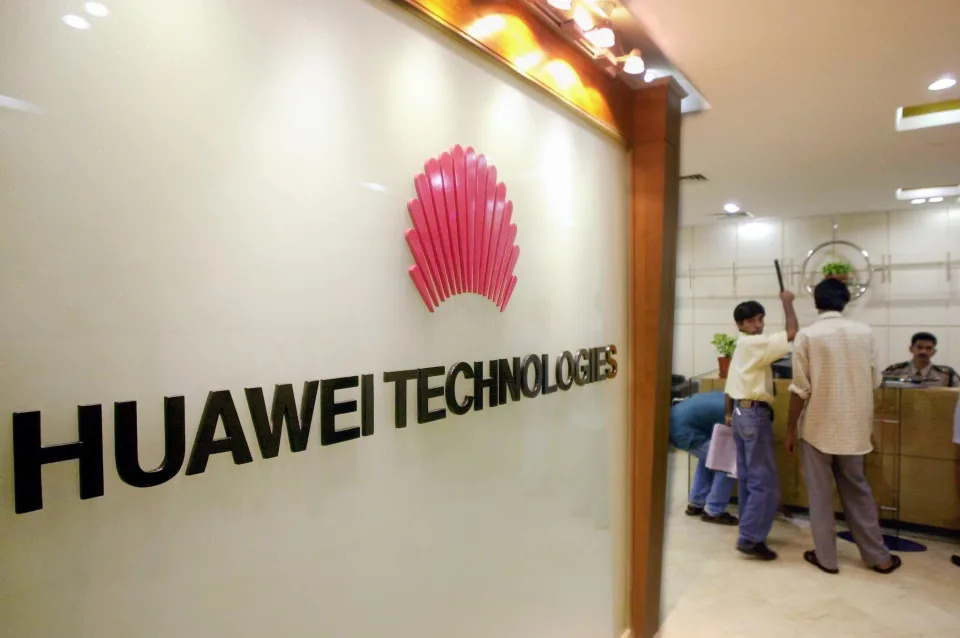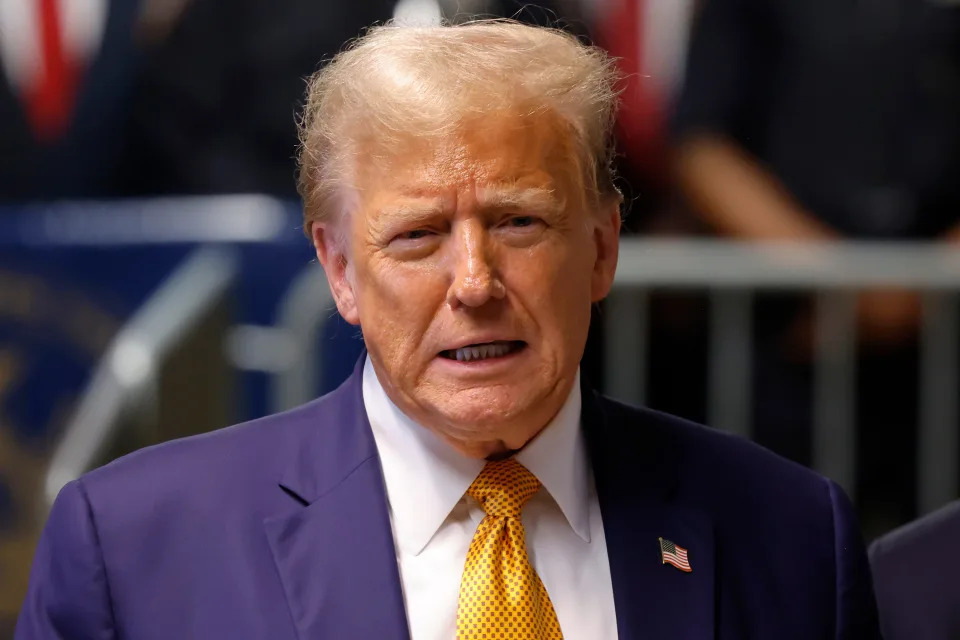Huawei spends millions at Canadian university, but some professors fear US crackdown
At least three University of British Columbia professors have shunned Huawei funding because they fear being labelled ‘enemies of the US’, colleague says
Huawei has continued to pour money into UBC projects, even after the arrest of Meng Wanzhou, as Canada’s allies tighten screws on the firm
Ian Young in Vancouver Published: 8 Jan, 2020
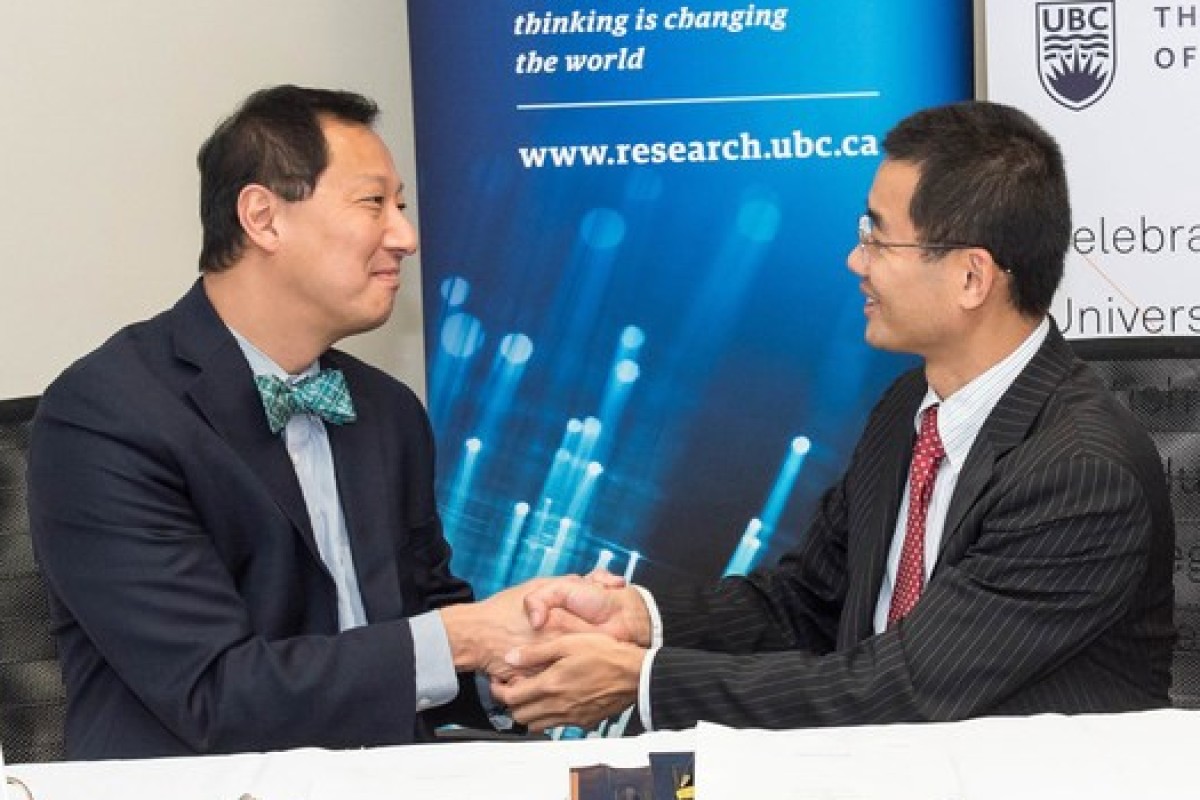
UBC President Santa Ono (left) and Huawei Canada Research President Christian Chua sign a 2017 deal for Huawei to provide C$3 million in umbrella funding to UBC researchers. Photo: CNW Group/Huawei Canada
Meng Wanzhou, Huawei’s chief financial officer, has said she might study for a doctorate in business administration at the University of British Columbia while on bail in Vancouver, as she undergoes a lengthy extradition process to face accusations of fraud in the US.
But at western Canada’s most prestigious university, some academics fear that connections to the Chinese tech firm could put them in peril, even as Huawei continues to spend millions on research there.
Since the arrest of Meng in December 2018, 18 new projects have been earmarked for Huawei funding at UBC, costing the company C$2.6 million (US$2 million), according to a spreadsheet provided by the university.
However, UBC engineering professor Lukas Chrostowski said he knew of at least three department colleagues who have refused to take part in Huawei-financed projects because they worry they will be swept up in US action against the firm.
If funding were to be cut off [from Huawei], then that is a major risk for academics in Canada UBC computer science professor Ivan Beschastnikh
His own work in photonics – the use of light to transmit and process data – is heavily funded by Huawei, including a C$900,000 (US$694,000) grant in January 2019. His other projects in recent years have received C$70,000 (US$54,000) from Huawei.
“You’ve got concerns – I’ve heard that because you are working with Huawei you would be labelled an enemy of the United States,” said Professor Chrostowski.
The fears come as Washington pressures Ottawa to follow its lead by banning Huawei from developing its national high-speed 5G internet infrastructure. US authorities have said that Huawei might imperil Canadian security – as well as that of its intelligence allies – by illicitly accessing state secrets or individuals’ private data.
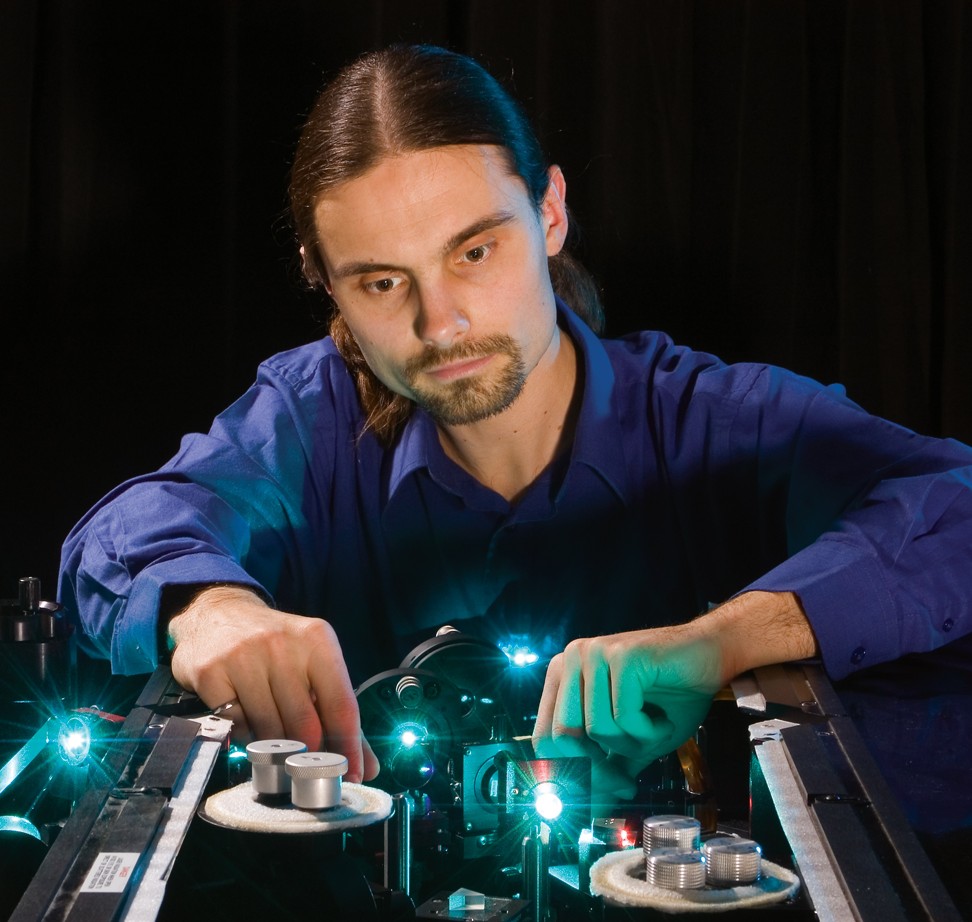
UBC engineering professor Lukas Chrostowski is an expert in the field of silicon photonics, with some of his research funded by Chinese tech giant Huawei. Photo: UBC / Janis Franklin
Vancouver has meanwhile been at the centre of the Huawei story since Meng was arrested at its international airport a year ago, at US request. With Meng still under guard at her Vancouver mansion and the formal stage of her extradition hearing to begin on January 20, the city remains on the cutting edge of tensions between China and the West.
Chrostowski – who said he personally knew three UBC professors who refused to work with Huawei, but declined to name them – said he had been closely following Meng’s case, and he and his colleagues were well aware of the security fears around the firm.
But their own concern, he said, “is not with Huawei, the concern is with the United States”.
“The concern is that the United States has policies that change in time and it is difficult to predict what kind of actions the US government will take,” he said.
Huawei, the telecommunications giant, has committed or spent C$7.8 million (US$6 million) on UBC projects since 2017. Projects under way are devoted to cloud computing, the privacy and security of artificial intelligence, digital image forgery detection and silicon chip fabrication, among other topics.
That includes an umbrella grant of C$3 million signed in 2017 by UBC President Santa Ono and Huawei Canada Research President Christian Chuat in a ceremony flanked by Chinese and Canadian flags.
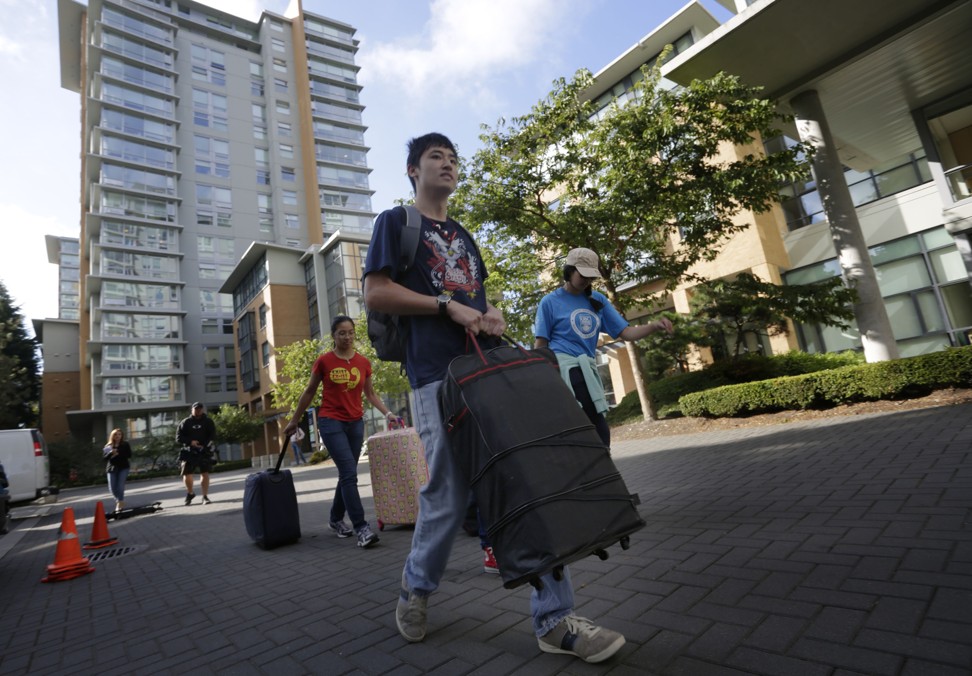
University students move in to campus accommodations at UBC in Vancouver in this 2015 file photo. Photo: Xinhua
UBC computer science professor Ivan Beschastnikh, whose recent projects have received C$420,450 in Huawei commitments, said the risk that a political decision would cut off such financing was “the biggest thing that I worry about”.
Other researchers were “biting their nails” waiting for a Canadian policy decision that could doom Huawei funding, Beschastnikh added. Because his own research was “tightly entwined with the fate of Huawei in Canada”, he said he was pursuing collaborations with other companies to hedge his bets.
The South China Morning Post sought comment from the lead researchers on all 32 UBC projects that have received Huawei funding since 2017. Of the 18 academics, only Chrostowski and Beschastnikh agreed to discuss their work and relationship with the firm.
“If funding were to be cut off [from Huawei], then that is a major risk for academics in Canada,” Beschastnikh said. “We need a heads up if this is going to happen. This can’t happen overnight.”
Fears of a Huawei ‘Trojan horse’
Nevertheless, critics of Canada’s government say it has been dragging its feet by failing to announce a strategy for handling Huawei, as allies such as the US, Australia and New Zealand ban it from 5G work or take other steps to mitigate potential security risks.
Instead, the Canadian Security Intelligence Service has issued vague warnings to universities about working with Huawei.
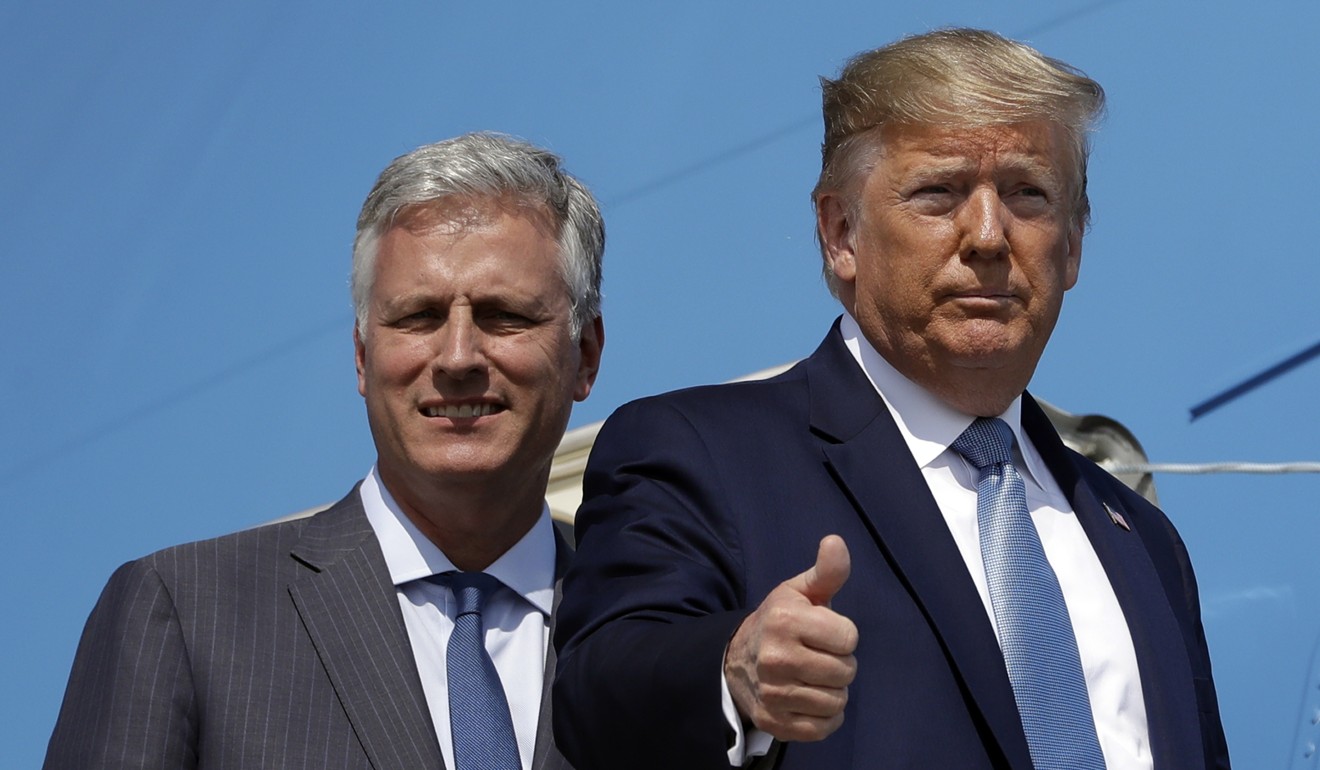
US President Donald Trump and his national security adviser Robert O'Brien. O’Brien has said Huawei would act as a “Trojan horse” if allowed to help build Canada’s 5G network. Photo: AP
Yet without an official policy framework, these “nebulous” intelligence briefings represented a challenge to academic freedom, said telecoms security expert Christopher Parsons, a senior research associate at the University of Toronto’s Munk School of Global Affairs and Public Policy.
Parsons said that the US was developing a “substantive firewall” of policies to limit what intellectual property US researchers could share with Chinese companies and institutions.
“In Canada we don’t have those directives. It’s not the fault of the universities. They’re following the law,” he said.
But he echoed the concerns of Chrostowski and Beschastnikh that, without policy guidance, academics in Canada risk running afoul of a US crackdown.
“They are put in a very challenging situation … Canadian researchers are engaged in research and sharing with Chinese companies including Huawei and it may turn out that those engagements run counter to US policies,” he said.
“That has implications for universities receiving status for their academics travelling in the United States. It could lead to broader socio-economic problems between Canada and the US.”
Gail Murphy, vice-president of research and innovation at UBC, said the university “is not aware of any restrictions regarding working with Huawei and will continue with its partnership with Huawei”.
She added it was up to faculty and student researchers to “choose whether or not they embark on research projects that are permitted within UBC policy”.
But looming over those decisions is the escalating US pressure.
You get Huawei into [the 5G network of] Canada or any other Western country, they’re going to know every health record, every banking record, every social media post Robert O’Brien, US national security adviser
In November, US national security adviser Robert O’Brien told a security forum in Halifax, Nova Scotia, that Huawei would act as a “Trojan horse” if allowed to help build Canada’s 5G network.
Even setting aside the risks to strategic intelligence, “you get Huawei into [the 5G network of] Canada or any other Western country, they’re going to know every health record, every banking record, every social media post”, O’Brien warned.
Huawei has repeatedly denied it poses any security risk to western countries.
Song Zhang, vice-president of research strategy and partnerships at Huawei Technologies Canada, said that Huawei had spent about C$650 million on research and development projects in Canada in the past decade, with about 10 per cent of that going to research partnerships, mostly at universities.
The Canadian Broadcasting Corporation reported in November that Huawei had made about C$56 million (US$43 million) in funding commitments to Canadian universities in recent years.
Working with Huawei was “a very natural thing” for Canadian researchers and not practically different to working with any other firm, he said.
Zhang said the rapid evolution of “negative pressures” on Huawei in Canada and the arrest of Meng had come as a “huge surprise” to him. “But we quickly realised, this is part of global politics that is beyond any individual’s control,” he said.
“Canada has always been a very open environment. That’s the underlying strength. Ultimately that gives me confidence.”
In the 10 years that Zhang has worked at Huawei, its Canadian R and D team had grown from a staff of 40 to 50 to about 1,000. Zhang said Canada held particularly importance as a global talent centre for Huawei, because the firm was no longer welcome in the US.
Huawei founder Ren Zhengfei, Meng’s father, told The Globe and Mail last month that Huawei was moving its US research centre to Canada in response to American sanctions, which he claimed made it impossible to even call or email staff in the US. In June, the firm said it had cut hundreds of jobs at its Silicon Valley centre.
Considering the restrictions Huawei faced in the US, Zhang said, it would not be surprising to see even more focus on Canada in the future.
That prospect will likely depend on whether Canada eventually follows Washington’s lead and takes a harder line on Huawei, and with its China policy in general.
Other voices in Canada have been trying to counter the US drumbeat. The waters of the Canada-China relationship had been “muddied” by former officials, now working for companies using Huawei products, making policy suggestions that reflected business interests, said Parsons of the Munk School.
Huawei clash with US ‘inevitable’, says tech giant’s founder Ren Zhengfei
“These are people with money in the game,” he said.
He pointed specifically at former deputy prime minister John Manley, now a director of telecom firm Telus, who last month called for a “prisoner exchange”: in return for China releasing the Canadians Michael Kovrig and Michael Spavor, who are being held on accusations of espionage, Canada could free Meng, Manley suggested.
Telus uses Huawei equipment in its infrastructure and is the Canadian firm most exposed to the impact of any ban on its gear.
“It is increasingly pressing that the Canadian government figure out broadly what its strategy is towards China,” Parsons said. “Part of that includes how they are going to deal with Huawei.”
Canada has always been a very open environment. That’s the underlying strength. Ultimately that gives me confidence Song Zhang, vice-president of research strategy and partnerships at Huawei Technologies Canada
Canadian researchers and Huawei alike deserved clarity, he said: the government had been “kicking the can down the road for more than a year and a half”.
Compared with its Five Eyes intelligence allies – the US, Britain, Australia and New Zealand – “Canada is the laggard” in addressing the Huawei situation, said Parsons.
Washington has introduced a range of sanctions on Huawei, effectively banning it from 5G networks in the US by prohibiting federal contractors from working with the firm and putting it on an export blacklist. Top US universities have frozen funding links with Huawei as a result.
Australia and New Zealand last year followed Washington’s lead by banning Huawei from 5G projects on security grounds.
Britain has deferred a decision on a possible ban, but last month Prime Minister Boris Johnson said the key criterion would be that it not “prejudice our ability to cooperate with other Five Eyes security partners”. The University of Oxford has already banned grants and donations from Huawei.
“The Americans have been very clear – both in the current and former [US] administrations – that if Canada allows the adoption of Huawei technology into our 5G networks, that will have possible substantive, perhaps irreparable, consequences for the types of information the Americans are willing to share with Canada,” Parsons said.
“If Canada loses that, we will go increasingly blind in the world.”
Meng’s ‘shadow’ looms over researchers
Meng, whose lawyer relayed her musings about studying for a PhD during her bail hearing in December 2018, has not yet been reported on UBC’s sprawling campus, about 8km from her C$13.6 million home on the west side of the city.
But her presence is felt in other ways.
Engineering professor Chrostowski said Meng’s arrest had “cast a shadow” over UBC researchers’ US interactions.
“Last summer the US imposed restrictions on who is able to work, and under what circumstances, with Huawei … so now we have restrictions where we can’t use US technology in the research we do with Huawei,” he said.
His C$900,000 neuromorphic computing project, launched just a month after Meng’s arrest, involves machine-learning using photonic processors.
Intellectual property generated by the research will be owned jointly by Huawei and UBC, although the university is not allowed to sell the technology to Huawei’s rivals for a window of several years, said Chrostowski. (Other partnerships involved Huawei as part of a consortium of tech firms, including US-based companies.)
The funding comes from Huawei Canada, “not Huawei China”, he stressed. “That’s an important distinction because Huawei Canada operates under the laws of Canada … any time we share information they have to ask us if it’s OK to share it with China. The information stays in Canada unless we agree to having it exported.”
Chrostowski’s relationship with Huawei dates back to 2011, when he met Huawei staffers at a course on silicon photonics he was teaching.
He said Huawei did not just finance research but was “highly involved” in previous joint projects – describing his first 2014 project with the company, he said that meetings were held every two weeks or monthly with a team of Huawei researchers.

UBC computer science professor Ivan Beschastnikh's recent projects have received C$420,450 (US$324,000) in Huawei funding. Photo: UBC
He said these were all Canadian citizens, ex-employees of Nortel scooped up by Huawei after the Canadian firm, once a world leader in telecoms technology, collapsed in 2009.
The demise of Nortel coincided with the rise of Huawei. In 2012, a former Nortel security adviser accused Huawei of having benefited from years of Chinese hacking of the Canadian firm; Huawei’s founder Ren has denied any role in Nortel’s collapse.
Asked whether he worried that Huawei posed a potential security risk to Canada, Chrostowski said: “I have been given assurances [by Huawei] that Huawei is not stealing information and data from Canadian users.”
He added: “I don’t have any reason to doubt that.”
Canada’s view of China worsens as Huawei, detention rows drag on
12 Dec 2019
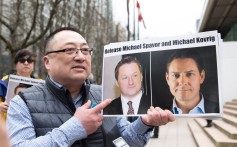
Computer scientist Beschastnikh has worked as principal investigator on four Huawei-financed projects at UBC since 2017. Topics have included optimising cloud data storage, finding bugs in cloud software and designing “peer to peer” machine learning that does not depend on a single centralised service or company.
He said his software-related topics were “in the clear” compared to hardware research, where security concerns about Huawei were focused. He had made it a condition of working with Huawei – and other firms – that resultant code be open source and available for public scrutiny.
Security concerns about Huawei were largely due to “fundamental weaknesses of the internet infrastructure we have created”, said Beschastnikh, with internet service providers having full control of how information was routed.
“So there’s a technical concern about the infrastructure that leads to these problems with power – power relationships at a nation-state level,” he said.
Previously, he said, the US had enjoyed a hegemony on the designs that underpinned the internet, and he believed some security concerns about Huawei were linked to protecting that hegemony. “Once you have a monopoly, you don’t want to give that up.”
Beschastnikh said that the computer science department at UBC had held discussions about the risks involved with Huawei funding. Ultimately, he felt “totally confident that the security risks [of working with Huawei] are mitigated by working on open source and staying away from certain topics”.
“A lot of the discussion [about Huawei] is very high level, nation-state level. But there’s a story to be told about the individual researchers who [are] biting their nails because the funding situation could be put in jeopardy.”
Who is JW00237? Secret Canada campaign to ban Huawei’s ‘spies’
6 Mar 2019
